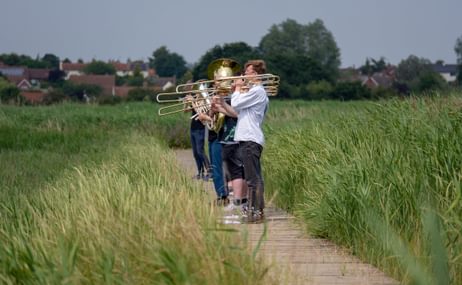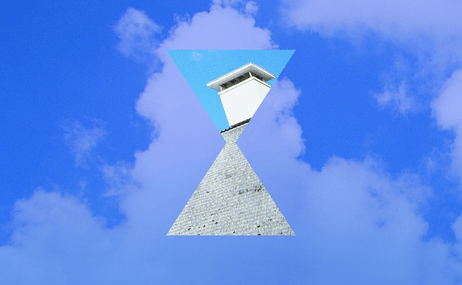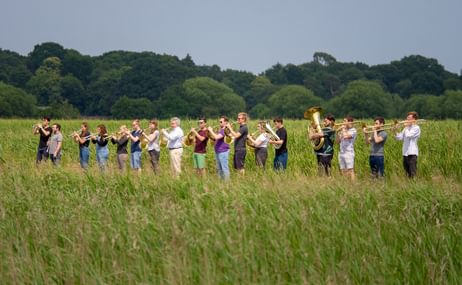The Britten Pears Young Artist Programme celebrates 50 years in 2022. This year the format was turned on its head. Here a young artist reflects on the experience, and Programme Manager, George Lee, explains how a more collaborative approach has led to an exciting cross-pollination of ideas, which will come to fruition at this year’s Aldeburgh Festival...
George Lee | Programme Manager
This year the Britten Pears Young Artist Programme has been very different, focussing on a group of 22 young artists who have been visiting Snape every 6-8 weeks across the year as a group. The cohort of artists included a mix of singers, pianists, chamber ensembles and composers. Britten Pears Young Artists have benefitted from a comprehensive and world-class artist development programme at Snape Maltings over a period of 12 months. The have all participated in a bespoke programme of projects and events that have been carefully curated by Britten Pears Arts, but that, importantly, leave space to react to each Young Artist’s individual development needs.
Soprano Katy Thomson’s upcoming performance at the 2022 Aldeburgh Festival is a direct result of the uniquely collaborative nature of BPYAP for 2021-22. This recital will feature Katy as one of the singers within this year’s cohort, working alongside Trio Mazzolini, one of the chamber ensembles for this year. Together they will be presenting an exciting recital focussing on the relationship between language, poetry and song. As part of this they will be performing Ravel’s Kaddish (from Two Hebrew Melodies),and premiering a new piece by Israeli-Canadian composer Omri Kochavi, also a Britten Pears Young Artist in 2021-22, written in response to the Ravel.
This collaboration grew naturally out the incredibly close bond that the whole cohort of artists has formed during their year on the programme. The cross pollination between different disciplines has created some exciting new ideas and forged some unique working relationships that will last long past the end of their time on the programme. Here Katy reflects on her experiences as a Britten Pears Young Artist.
Diary | Katy Thomson, programme participant
On a cold, grey November morning I set off for Suffolk, exhausted from navigating the uncertainties of life as a freelance musician. I am not alone in feeling close to burn out: we have all been striving to keep creating, to find some way to make a living, in increasingly trying times. We are still living through the Covid-19 pandemic; work is scarce. It can feel like you are constantly swimming upstream. I work tirelessly, yet feel as though I am not keeping up with the pace. Like other conservatoire graduates, I have spent many years and many thousands of pounds striving to achieve excellence – only to find that, when crisis hits, excellence isn’t enough.
No matter what you might be facing in life outside, Snape Maltings offers time and space to feel safe to create
The cold air bites my fingers as I key in the code for the Hoffman building. As I walk through the polished concrete corridor, a sense of familiarity warms me. Friends and colleagues wrapped up in all things knitted greet each other, an instant understanding flowing between them. This is now our third course as a cohort and it is nothing short of miraculous how close we have become, personally and artistically. We have explored who we want to be as artists, we have improvised and experimented, we have challenged and encouraged. We sit in a circle for the opening session, and the extraordinary Yve and Tim curate a welcoming space for inquiry: what does ‘Community Music’ mean to you, truthfully? Not the InstagramLive answer, what do you really feel? Ideas and anecdotes flow freely. We have arrived. We are all reassured and empowered to be open, to bring our full authentic selves to the next three days.

Aldeburgh Festival
It is nothing short of miraculous how close we have become, personally and artistically
No matter what you might be facing in life outside, Snape Maltings offers time and space to feel safe to create. Over the next three days, we learn through play (nobody is ever too old for musical games), personal reflection and sharing our vulnerability with honesty – witnessing others giving so generously of themselves inspires us to try new things. We explore different ways to lead group sessions: not just the conventional one-way transfer of information but fielding ideas and facilitating the creativity of the group to take the session in new directions. It is initially terrifying (for control-freaks like me), but soon becomes liberating and exciting. Have you ever heard Dido’s Lament played on guitar, marimba, violin and cello? You haven’t lived.
If we are open to the possibilities that come from uncertainty, we free ourselves to go on a journey
“Don’t read the map – take us on a journey,” says Yve. It strikes a chord somewhere deep within my pandemic-ravaged brain. How often do we confine ourselves to the need to follow a map? How often do we fear the consequences of straying from that map? None of us has a map right now. And that is OK. More than that – seen in the right way, it is an advantage. If we are open to the possibilities that come from uncertainty, we free ourselves to go on a journey. Judging by the results of last week’s sessions, that journey is so much sweeter when you don’t read the map.
Read More

Support Britten Pears Young Artist Programme
Help us nurture future generations of professional musicians long into the future.
Donate
Britten Pears Young Artist Programme at 50
In 2022 we celebrate 50 years of the Britten Pears Young Artist Programme, which has offered inspirational coaching and development opportunities to many of the world’s leading classical music stars.
Find out more

